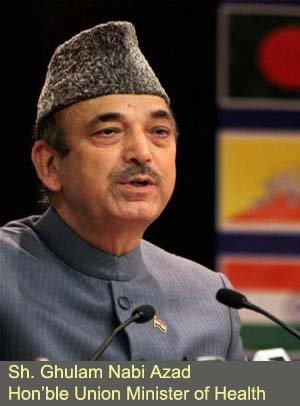HIV infections on decline in India, says health minister
January 16, 2013 | Wednesday | News | By BioSpectrum Bureau
HIV infections on decline in India, says health minister
The union minister for health, Mr Ghulam Nabi Azad speaking about NCDs at the BRICS health ministers' meeting held at New Delhi
The union minister for health, Mr Ghulam Nabi Azad has said that the successful implementation of the human immunodeficiency virus/ acquired immune deficiency syndrome (HIV/AIDS) program by India has earned global appreciation. "The new evidence, from the latest round of HIV estimations, corroborates the fact that there is consistent decline in HIV prevalence, new infections as well as deaths due to AIDS-related causes in India. The reduction in annual new HIV infections by around 57% over the last decade signifies the progress towards halting and reversing the epidemic," explained the minister while speaking at the BRICS (Brazil, Russia, India, China, and South Africa) health ministers' meeting held at New Delhi on January 11, 2013.
Keeping in view the rapidly increasing burden of non-communicable diseases (NCDs) across the globe, the health ministry has launched mass screening for early detection of NCDs like diabetes, hypertension and cancer. With a substantial increase in the budget outlay for health, the ministry proposes to take several new initiatives to consolidate the gains and to fill up the gaps in critical areas of healthcare, research, human resources and infrastructure, over the next five years.
Speaking further on the issue, Mr Azad stated, "The special session of the UN General Assembly, held on September 2011, recognized the escalating threat posed by NCDs to the continued economic development of low and middle income countries and also their being a major barrier to the achievement of millennium development goals relating to poverty reduction, maternal and child health, control of AIDS, tuberculosis and malaria. We must, therefore, learn from each other and commit to fight NCDs together on the BRICS platform, through innovative strategies."
The meeting was also addressed by Mr Chen Zhu, minister of health, people's republic of China; Dr Pakishe Aaron Motsoaledi, minister of health, South Africa; Mr Sergey Velmyaykin, deputy minister of health, Russia; Mr RS Padilha, minister of health, Brazil; Mr Michael Sidibe, executive director, UNAIDS; and Dr S Plianbangchang, regional director, WHO, South-East Asia Regional Office (SEARO).









